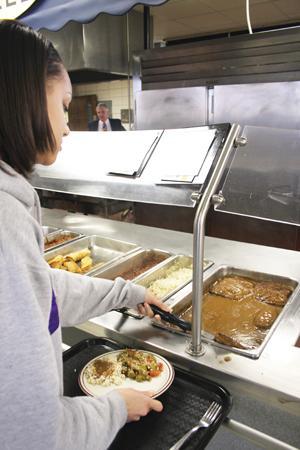David Heidke, director of LSU Dining Services, said he takes no chances when it comes to food safety – especially after the nation’s largest beef recall.
A California meat company issued the recall of 143 million pounds of beef this past week. The recall includes beef produced since Feb. 1, 2006, some of which was served to school lunch programs but not the University.
Heidke said more needs to be done to make sure this does not happen.
“From a personal standpoint, we need a little oversight,” Heidke said. “The laws are there, but where is the follow-up?”
Heidke said if contaminated beef that LSU Dining served got someone sick, the Louisiana Health Department would be on-site immediately. He said the facility would likely close depending on what happened.
LSU Dining works with a quality assurance program to provide inspections. Heidke said the quality assurance program would bring inspectors on-site and determine what happened. He said from that point, LSU Dining would take those results and decide what actions needed to be taken.
Heidke said if there was a recall that affected the University, he and his staff would know soon after.
“It’s very clear what could be hazardous, and our company is on it immediately,” Heidke said. “We’re in the store room checking the codes on the boxes to better serve our customers.”
Past vendors have lost the University’s business if the company failed to meet requirements. Heidke said LSU Dining only uses suppliers with good quality service programs and a large amount of liability insurance. He said LSU Dining wants to ensure safety for its customers.
“We had a problem with green onions, and there wasn’t a ban on them, but there was a question,” Heidke said. “Rather than take any risks, we removed them from every facility until we were certain they were safe.”
Vanessa Richard, registered dietitian at the Student Health Center, said the Center has an emergency plan.
“If a large quantity of students are coming in with food poisoning or symptoms of that, we go into our emergency preparedness mode,” Richard said. “We would act as a station to get students who were ill stabilized and then get them to the appropriate medical facility.”
Richard said if students were served contaminated food, the center would advertise signs and symptoms of food-borne illnesses. She said they would also make sure students were aware of the appropriate treatment.
“In any event of an on-campus outbreak, we are well-equipped to handle that,” Richard said. “We have policies and procedures in place even if there is a communitywide outbreak.”
Richard said if students learn that they have a food-borne illness, they need to go to the establishment that served the food.
Heidke said he has had students approach him with complaints of becoming sick from LSU Dining. He said investigations showed they got sick from another source, but they contacted their quality assurance department to find out if they could be held accountable.
LSU Dining works with different companies to ensure it meets health requirements. Heidke said an independent company, Steritech, conducts random inspections.
“The state of Louisiana has a requirement that every manager and/or supervisor is trained in safe food handling,” Heidke said. “We have a program called ServSafe. All of my managers are required to be certified in ServSafe, and that certification has to be renewed every three years. The industry standard is every five, but our standards are every three.”
Katherine Schulz, geography sophomore, said she has never gotten sick from on-campus food. She said everything is sanitary.
“I’ve never seen dirty utensils or anything like that,” Schulz said.
Alexandra Panicucci, communication studies sophomore, said she eats at the dining halls almost every day. She said the food seems to be served safely, and everything looks clean. However, she said she has had problems at the Tiger Lair in the Union.
“I’ve found a bug in my fruit salad before,” Panicucci said. “I just stopped eating it. But I’ve had friends that found bugs as well and exchanged it for another.”
Heidke said there are more than 400 employees working in LSU Dining. He said it is as important to worry about what the employees hygiene habits are in the kitchen “as is keeping something the right temperature.”
—-
Contact Sean Griffin at sgriffin@lsureveille.com
Nation’s largest beef recall does not affect LSU Dining
By Sean Griffin
February 29, 2008

Melinda Hunter, biological engineering freshman, scoops a slab of meatloaf onto her plate Thursday afternoon in the Pentagon Dining Hall.



